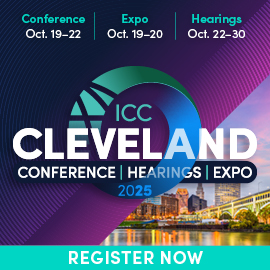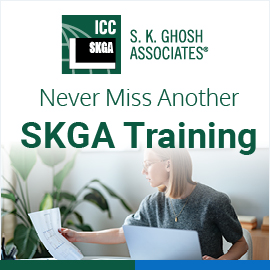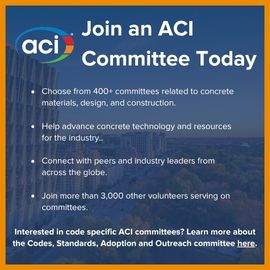Part 3 of this 6-part series will provide information to assist building officials during the plan review process on the proper evaluation of structural loads per the 2024 International Building Code (IBC) and the IBC-referenced 2022 ASCE/SEI 7 Minimum Design Loads and Associated Criteria for Buildings and Other Structures (ASCE 7-22). This presentation covers the determination of flat roof snow loads, sloped roof snow loads, unbalanced roof snow loads and snow drift loads on a variety of flat and sloped roofs. Also discussed are provisions for atmospheric ice loads.
In the protection the heath of the pubic served, operation and maintenance for Public Pools and Spas is of the upmost importance. With the recent development of the ANSI PHTA/ICC-2 Standard for Public Pool sand Spas Operations and Maintenance, this panel of industry experts will discuss some important topics focused on Public Pools and Spas.
This presentation will teach participants how to perform a simple plan review in compliance with the International Residential Code. Participants will gain a better understanding of the requirements for a simple structure as well as why those requirements are critical in the building process. Participants will use this knowledge as our subject matter expert walks us through the plan review process for a simple structure. Best practices will be shared, including materials that will ensure a smooth plan review process for both staff and customers.
This presentation will introduce you to the backflow requirements that are included in the IPC. It will address the needs of code officials, contractors, installers, and plumber. The seminar will include information regarding the requirements for protecting the potable water supply from contamination.
Effective writing is vital to your career as an inspector, notices of violation, letters and reports are public documents that may be read by supervisors, attorneys, judges, citizens, design professionals, contractors and reporters. This presentation provides an overview of the knowledge and skills needed for effectively writing reports and violation notices for code professionals of all levels. Participants will learn the importance of writing a good report, writing professional sentences and choosing the correct terminology to use. Through examples and practice opportunities, participants will become more skilled at writing and editing their work.
This webinar provides an overview of the global advancement of the use of hydrogen gas, U.S. Federal Government actions taken to support the hydrogen industry. Discussion on how natural gas/hydrogen blended fuel introduction into the built environment. We will discuss resources for building and fire officials for the safe use of hydrogen, and as well as the current requirements for the installation of gaseous hydrogen systems as regulated by Chapter 7 of the 2021 International Fuel Gas Code (IFGC).
This 6 hour seminar reviews and analyzes selected significant changes from the 2018 IBC® to the 2021 IBC®. Discussions will assist code users in identifying the specific code changes that have occurred, and more importantly, understanding the reason behind the change. Finally, it explains those code changes selected due to their frequency of application, special significance or change in application.
This seminar educates new code officials in basic concepts of code enforcement and provides an opportunity to master skills that are fundamental to performing the duties of a code official. The goal of this training is to ensure that the Participants will be able to explain the fundamentals of code enforcement and describe the duties of a code official.
This seminar addresses the necessary soft skills for success as an inspector—those non-technical traits and behaviors that enhance an inspector’s ability to interact with others and to successfully carry out their job duties. These include people skills such as effective communication, diplomacy and customer service, but also include skills for problem solving, professionalism, integrity, and time management. In addition to a solid understanding of the technical provisions of the codes, developing appropriate soft skills are essential in pursuing the goal of safe, healthy and durable buildings for the community. Developed specifically for construction inspectors in all disciplines, the topics covered are equally important to all employees of public service agencies including permit technicians, plan reviewers, managers, building officials and fire code officials. The information is also beneficial for developing policies and procedures to promote consistent and fair inspection practices while improving communications and public relations.
This seminar will introduce the application of the IFC administrative requirements, occupancy classification, general precautions against fire, emergency planning and preparedness, fire service features, interior finish, decorative materials and furnishings, fire protection systems, means of egress, and provide an introduction to hazardous materials. Activities and discussions will further enhance participant learning. This seminar is designed to familiarize and assist code officials in locating, describing and applying applicable code requirements of the IFC to determine compliance or noncompliance.





